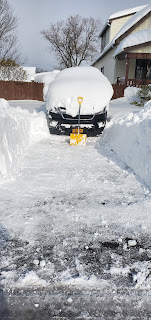The Five Stages Of Western New York Lake Effect Grief
Lake-effect snow occurs when dry, freezing air picks up moisture as it passes over a body of water. The water evaporates into the air and as it hits land cools and transforms into heavy wet and often voluminous snowflakes.
Normally this snow is a bit of a nuisance to the people of Western New York, especially in Erie County/Buffalo. But sometimes it can be devastating as it was from November 17-20, 2022, when upwards of seven-feet of snow fell in the southern part of Erie County.
In addition to having a strong back you need a certain amount of mental toughness to endure these once in a decade snow events. Though I have no certifications or official training as grief counselor, as a lifelong resident of Erie County I am an expert in the five stages of lake effect grief.
The Five Stages Of Western New York Lake Effect Grief
Denial.
Middle of November
And the always too bright
The always too chipper
Local weather person with white capped teeth
Says prepare thy snow throwers
Extract thy snow shovels from the garage rafters
Lake Effect devastation is upon us
You call bullshit
Say these forecasts are wrong as much as they are right
And with a sardonic laugh you say:
If only I had a job where I could be wrong half the time
Anger.
But deep down you know these
White capped tooth bastards are right
They’re always right about the lake effect
This is fucking Buffalo . . .
When the call comes from your Florida friend
Who crows with a trenchant snort to be careful shoveling
Because you’re a lot closer to seventy than thirty
It takes great strength not to verbally blow him up
And you secretly hope the next Florida hurricane
Takes out some roofing or sections of fencing
Or does some other damage to his house
Bargaining.
As the heavy wet flakes swirl relentlessly
For hour upon hour and pile up on the ground
You pray to God for mercy
After all you are closer to seventy than thirty
And you promise that
You’ll really try to listen to your wife’s work stories
You’ll put the seat down and put away the dishes
You’ll quit threatening to throw all her junk out
You’ll stop stalking high school girlfriends on Facebook
You'll go to bed before proving everyone on Twitter wrong
But alas . . .
It keeps snowing and snowing and snowing
Depression.
Having failed to receive any of God’s grace
You know what needs to be done
And listlessly affix the air pods, boots, hat, gloves and coat
Of course, last year’s gas is still in the snowblower
And the fucking thing won’t start
You grab a shovel and try to listen to
Thomas Pynchon's, “The Crying of Lot 49”
But you understand it even less
Now that you’re closer to seventy than thirty
But you soldier on one shovel full at a time
And are reminded of not being able to leave the dinner table
Until you ate your brussel sprouts one mouthful at a time
Mom could be such a hard ass
Acceptance
One shovel full at a time you move the wet white mud
It hurts your melancholic head and your declining body
Because, after all you are closer to seventy than thirty
But soon a path forms, widens and reaches an end point
You feel the muscle memory return Your breathing evens out and your core tightens
That Robyn Hitchcock song “Meat,” makes you dance a little
Starting to feel it, you give a thumbs up to your scary neighbor
Who has all the pro-gun signs on his lawn as he digs his truck out
Suddenly you have your stroke back and you’re flicking snow
Like Tiger hits it three-hundred, like Josh throws it seventy
Though there’s still lots to do, it’s alright, you know you’ll make it
With ibuprofen . . . and bourbon





